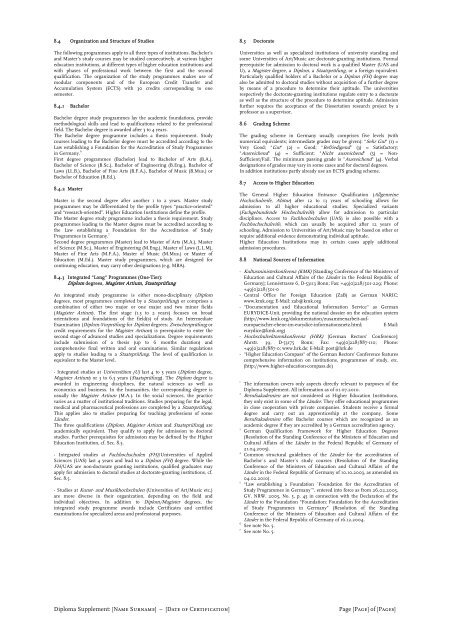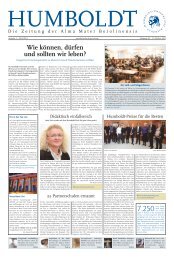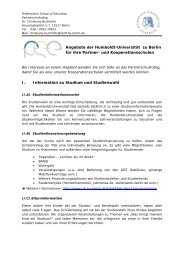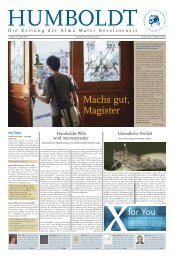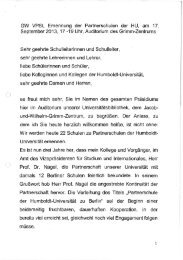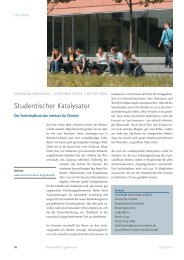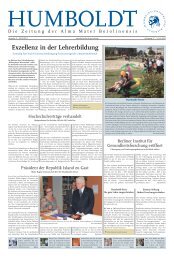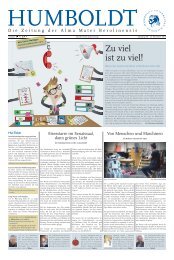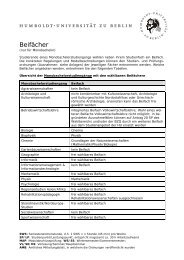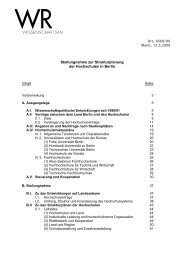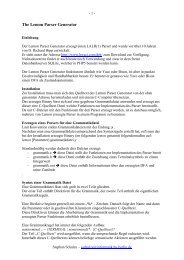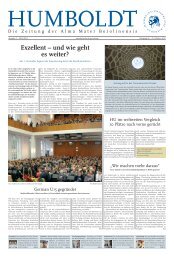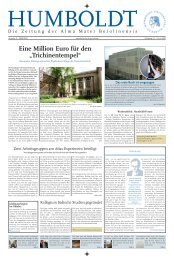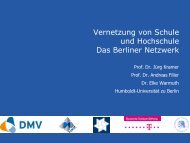130205_Protokoll PSE IR MV.pdf - Hu-berlin.de
130205_Protokoll PSE IR MV.pdf - Hu-berlin.de
130205_Protokoll PSE IR MV.pdf - Hu-berlin.de
Sie wollen auch ein ePaper? Erhöhen Sie die Reichweite Ihrer Titel.
YUMPU macht aus Druck-PDFs automatisch weboptimierte ePaper, die Google liebt.
8.4 Organization and Structure of Studies<br />
The following programmes apply to all three types of institutions. Bachelor’s<br />
and Master’s study courses may be studied consecutively, at various higher<br />
education institutions, at different types of higher education institutions and<br />
with phases of professional work between the first and the second<br />
qualification. The organization of the study programmes makes use of<br />
modular components and of the European Credit Transfer and<br />
Accumulation System (ECTS) with 30 credits corresponding to one<br />
semester.<br />
8.4.1 Bachelor<br />
Bachelor <strong>de</strong>gree study programmes lay the aca<strong>de</strong>mic foundations, provi<strong>de</strong><br />
methodological skills and lead to qualifications related to the professional<br />
field. The Bachelor <strong>de</strong>gree is awar<strong>de</strong>d after 3 to 4 years.<br />
The Bachelor <strong>de</strong>gree programme inclu<strong>de</strong>s a thesis requirement. Study<br />
courses leading to the Bachelor <strong>de</strong>gree must be accredited according to the<br />
Law establishing a Foundation for the Accreditation of Study Programmes<br />
in Germany. 6<br />
First <strong>de</strong>gree programmes (Bachelor) lead to Bachelor of Arts (B.A.),<br />
Bachelor of Science (B.Sc.), Bachelor of Engineering (B.Eng.), Bachelor of<br />
Laws (LL.B.), Bachelor of Fine Arts (B.F.A.), Bachelor of Music (B.Mus.) or<br />
Bachelor of Education (B.Ed.).<br />
8.4.2 Master<br />
Master is the second <strong>de</strong>gree after another 1 to 2 years. Master study<br />
programmes may be differentiated by the profile types “practice-oriented”<br />
and “research-oriented”. Higher Education Institutions <strong>de</strong>fine the profile.<br />
The Master <strong>de</strong>gree study programme inclu<strong>de</strong>s a thesis requirement. Study<br />
programmes leading to the Master <strong>de</strong>gree must be accredited according to<br />
the Law establishing a Foundation for the Accreditation of Study<br />
Programmes in Germany. 7<br />
Second <strong>de</strong>gree programmes (Master) lead to Master of Arts (M.A.), Master<br />
of Science (M.Sc.), Master of Engineering (M.Eng.), Master of Laws (L.L.M),<br />
Master of Fine Arts (M.F.A.), Master of Music (M.Mus.) or Master of<br />
Education (M.Ed.). Master study programmes, which are <strong>de</strong>signed for<br />
continuing education, may carry other <strong>de</strong>signations (e.g. MBA).<br />
8.4.3 Integrated "Long" Programmes (One-Tier):<br />
Diplom <strong>de</strong>grees, Magister Artium, Staatsprüfung<br />
An integrated study programme is either mono-disciplinary (Diplom<br />
<strong>de</strong>grees, most programmes completed by a Staatsprüfung) or comprises a<br />
combination of either two major or one major and two minor fields<br />
(Magister Artium). The first stage (1.5 to 2 years) focuses on broad<br />
orientations and foundations of the field(s) of study. An Intermediate<br />
Examination (Diplom-Vorprüfung for Diplom <strong>de</strong>grees; Zwischenprüfung or<br />
credit requirements for the Magister Artium) is prerequisite to enter the<br />
second stage of advanced studies and specializations. Degree requirements<br />
inclu<strong>de</strong> submission of a thesis (up to 6 months duration) and<br />
comprehensive final written and oral examinations. Similar regulations<br />
apply to studies leading to a Staatsprüfung. The level of qualification is<br />
equivalent to the Master level.<br />
- Integrated studies at Universitäten (U) last 4 to 5 years (Diplom <strong>de</strong>gree,<br />
Magister Artium) or 3 to 6.5 years (Staatsprüfung). The Diplom <strong>de</strong>gree is<br />
awar<strong>de</strong>d in engineering disciplines, the natural sciences as well as<br />
economics and business. In the humanities, the corresponding <strong>de</strong>gree is<br />
usually the Magister Artium (M.A.). In the social sciences, the practice<br />
varies as a matter of institutional traditions. Studies preparing for the legal,<br />
medical and pharmaceutical professions are completed by a Staatsprüfung.<br />
This applies also to studies preparing for teaching professions of some<br />
Län<strong>de</strong>r.<br />
The three qualifications (Diplom, Magister Artium and Staatsprüfung) are<br />
aca<strong>de</strong>mically equivalent. They qualify to apply for admission to doctoral<br />
studies. Further prerequisites for admission may be <strong>de</strong>fined by the Higher<br />
Education Institution, cf. Sec. 8.5.<br />
- Integrated studies at Fachhochschulen (FH)/Universities of Applied<br />
Sciences (UAS) last 4 years and lead to a Diplom (FH) <strong>de</strong>gree. While the<br />
FH/UAS are non-doctorate granting institutions, qualified graduates may<br />
apply for admission to doctoral studies at doctorate-granting institutions, cf.<br />
Sec. 8.5.<br />
- Studies at Kunst- and Musikhochschulen (Universities of Art/Music etc.)<br />
are more diverse in their organization, <strong>de</strong>pending on the field and<br />
individual objectives. In addition to Diplom/Magister <strong>de</strong>grees, the<br />
integrated study programme awards inclu<strong>de</strong> Certificates and certified<br />
examinations for specialized areas and professional purposes.<br />
8.5 Doctorate<br />
Universities as well as specialized institutions of university standing and<br />
some Universities of Art/Music are doctorate-granting institutions. Formal<br />
prerequisite for admission to doctoral work is a qualified Master (UAS and<br />
U), a Magister <strong>de</strong>gree, a Diplom, a Staatsprüfung, or a foreign equivalent.<br />
Particularly qualified hol<strong>de</strong>rs of a Bachelor or a Diplom (FH) <strong>de</strong>gree may<br />
also be admitted to doctoral studies without acquisition of a further <strong>de</strong>gree<br />
by means of a procedure to <strong>de</strong>termine their aptitu<strong>de</strong>. The universities<br />
respectively the doctorate-granting institutions regulate entry to a doctorate<br />
as well as the structure of the procedure to <strong>de</strong>termine aptitu<strong>de</strong>. Admission<br />
further requires the acceptance of the Dissertation research project by a<br />
professor as a supervisor.<br />
8.6 Grading Scheme<br />
The grading scheme in Germany usually comprises five levels (with<br />
numerical equivalents; intermediate gra<strong>de</strong>s may be given): "Sehr Gut" (1) =<br />
Very Good; "Gut" (2) = Good; "Befriedigend" (3) = Satisfactory;<br />
"Ausreichend" (4) = Sufficient; "Nicht ausreichend" (5) = Non-<br />
Sufficient/Fail. The minimum passing gra<strong>de</strong> is "Ausreichend" (4). Verbal<br />
<strong>de</strong>signations of gra<strong>de</strong>s may vary in some cases and for doctoral <strong>de</strong>grees.<br />
In addition institutions partly already use an ECTS grading scheme.<br />
8.7 Access to Higher Education<br />
The General Higher Education Entrance Qualification (Allgemeine<br />
Hochschulreife, Abitur) after 12 to 13 years of schooling allows for<br />
admission to all higher educational studies. Specialized variants<br />
(Fachgebun<strong>de</strong>n<strong>de</strong> Hochschulreife) allow for admission to particular<br />
disciplines. Access to Fachhochschulen (UAS) is also possible with a<br />
Fachhochschulreife, which can usually be acquired after 12 years of<br />
schooling. Admission to Universities of Art/Music may be based on other or<br />
require additional evi<strong>de</strong>nce <strong>de</strong>monstrating individual aptitu<strong>de</strong>.<br />
Higher Education Institutions may in certain cases apply additional<br />
admission procedures.<br />
8.8 National Sources of Information<br />
- Kultusministerkonferenz (KMK) [Standing Conference of the Ministers of<br />
Education and Cultural Affairs of the Län<strong>de</strong>r in the Fe<strong>de</strong>ral Republic of<br />
Germany]; Lennéstrasse 6, D-53113 Bonn; Fax: +49[0]228/501-229; Phone:<br />
+49[0]228/501-0<br />
- Central Office for Foreign Education (ZaB) as German NARIC;<br />
www.kmk.org; E-Mail: zab@kmk.org<br />
- "Documentation and Educational Information Service" as German<br />
EURYDICE-Unit, providing the national dossier on the education system<br />
(http://www.kmk.org/dokumentation/zusammenarbeit-aufeuropaeischer-ebene-im-eurydice-informationsnetz.html;<br />
E-Mail:<br />
eurydice@kmk.org)<br />
- Hochschulrektorenkonferenz (HRK) [German Rectors’ Conference];<br />
Ahrstr. 39, D-53175 Bonn; Fax: +49[0]228/887-110; Phone:<br />
+49[0]228/887-0; www.hrk.<strong>de</strong>; E-Mail: post@hrk.<strong>de</strong><br />
- "Higher Education Compass" of the German Rectors’ Conference features<br />
comprehensive information on institutions, programmes of study, etc.<br />
(http://www.higher-education-compass.<strong>de</strong>)<br />
1<br />
The information covers only aspects directly relevant to purposes of the<br />
Diploma Supplement. All information as of 01.07.2010.<br />
2<br />
Berufsaka<strong>de</strong>mien are not consi<strong>de</strong>red as Higher Education Institutions,<br />
they only exist in some of the Län<strong>de</strong>r. They offer educational programmes<br />
in close cooperation with private companies. Stu<strong>de</strong>nts receive a formal<br />
<strong>de</strong>gree and carry out an apprenticeship at the company. Some<br />
Berufsaka<strong>de</strong>mien offer Bachelor courses which are recognized as an<br />
aca<strong>de</strong>mic <strong>de</strong>gree if they are accredited by a German accreditation agency.<br />
3<br />
German Qualification Framework for Higher Education Degrees<br />
(Resolution of the Standing Conference of the Ministers of Education and<br />
Cultural Affairs of the Län<strong>de</strong>r in the Fe<strong>de</strong>ral Republic of Germany of<br />
21.04.2005).<br />
4<br />
Common structural gui<strong>de</strong>lines of the Län<strong>de</strong>r for the accreditation of<br />
Bachelor´s and Master´s study courses (Resolution of the Standing<br />
Conference of the Ministers of Education and Cultural Affairs of the<br />
Län<strong>de</strong>r in the Fe<strong>de</strong>ral Republic of Germany of 10.10.2003, as amen<strong>de</strong>d on<br />
04.02.2010).<br />
5<br />
“Law establishing a Foundation ´Foundation for the Accreditation of<br />
Study Programmes in Germany´”, entered into force as from 26.02.2005,<br />
GV. NRW. 2005, No. 5, p. 45 in connection with the Declaration of the<br />
Län<strong>de</strong>r to the Foundation “Foundation: Foundation for the Accreditation<br />
of Study Programmes in Germany” (Resolution of the Standing<br />
Conference of the Ministers of Education and Cultural Affairs of the<br />
Län<strong>de</strong>r in the Fe<strong>de</strong>ral Republic of Germany of 16.12.2004.<br />
6<br />
See note No. 5.<br />
7<br />
See note No. 5.<br />
Diploma Supplement: [Name Surname] – [Date of Certification]<br />
Page [Page] of [Pages]


